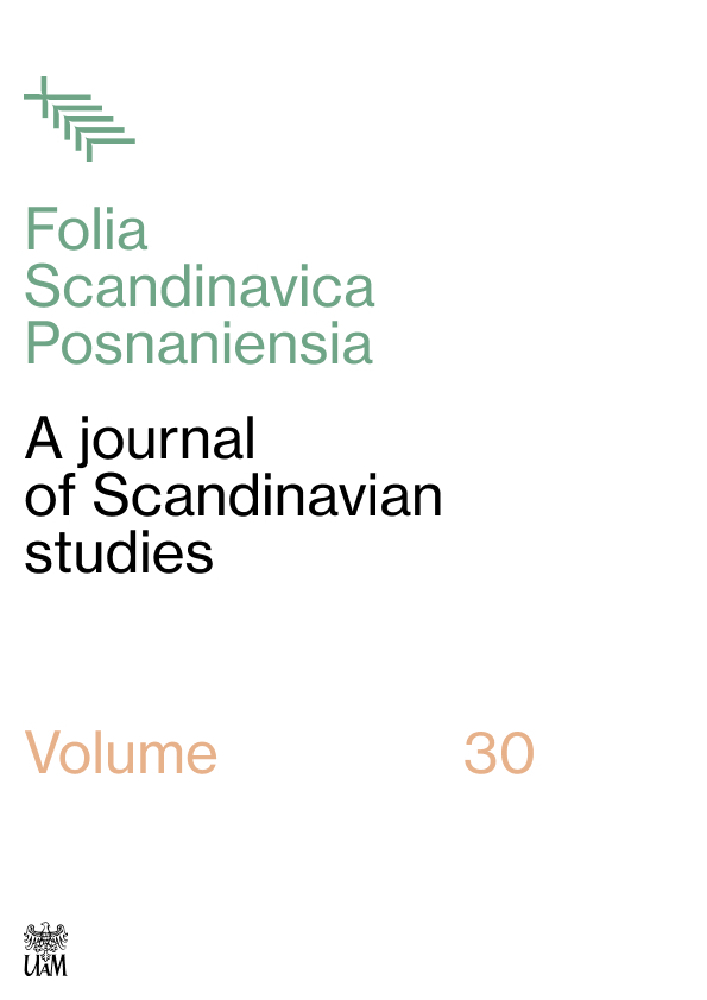Abstract
Tranströmer’s prose poem Blåsipporna ("The Liverleafs") is rather cryptic. By reading the text in the light of Kant’s theory of the sublime and by focusing on its mysterious and paradoxical aspects, this essay seeks to unveil the poem’s hidden eschatology. The poem’s transcendence is the result of the rhetorical and literary devices the poet is using to depict an ecstatic experience. Such an experience is beyond rationality, hence the wording’s irrationality. In addition, the poem addresses silence, as the experience of ecstasy can never be expressed by words. Thus, "Blåsipporna" is a piece of art and a sacred text at the same time.
References
Bergsten, S. (1984). Kort paus i orgelkonserten. Meditation över en Tranströmerdikt. Vår Lösen, årg. 75, 174–187.
Bergsten, S. (1989). Den trösterika gåtan. Tio essäer om Tomas Tranströmers lyrik. Stockholm: FIB:s lyrikklubb.
Bergsten, S. (2011). Tomas Tranströmer. Ett diktarporträtt. Stockholm: Albert Bonniers Förlag.
Espmark, K. (1983). Resans formler. En studie i Tomas Tranströmers poesi. Stockholm: Norstedt.
Joas, H. (2017). Die Macht des Heiligen. Eine Alternative zur Geschichte von der Entzauberung. Berlin: Suhrkamp.
Kant, I. [1790]. Kritik der Urteilskraft und Schriften zur Naturphilosophie. (= Werke in sechs Bänden, Band V) Darmstadt, 1998: Wissenschaftliche Buchgesellschaft.
Nietzsche, F. (1988). Kritische Studienausgabe, hrsg. von G. Colli und M. Montinari, Band 9 und 13. Berlin et al.: De Gruyter.
Otto, R. [1917]. Das Heilige. Über das Irrationale in der Idee des Göttlichen und sein Verhältnis zum Rationalen. München, 1991: C.H. Beck.
Pfister, F. (1959). «Ekstase». In: Reallexikon für Antike und Christentum, Band IV, Sp. 944–988. Stuttgart: Hiersemann.
Picard, M. (31959). Die Welt des Schweigens. Erlenbach-Zürich/Stuttgart: Eugen Rentsch Verlag.
Rönnerstrand, T. (1988). Språket och tystnaden – om ett motiv hos Tomas Tranströmer. Nordisk tidskrift för vetenskap, konst och industri, årg. 64, häfte 5, 420–427.
Rousseau, J.-J. [1762]. Emile oder über die Erziehung. In: https://gutenberg.spiegel.de/buch/emil-oder-ueber-die-erziehung-erster-band-3811/2 [24.10.2019].
Schiöler, N. (1999). Koncentrationens konst. Tomas Tranströmers senare poesi. Stockholm: Bonnier.
Silesius, Angelus (o.J.). Cherubinischer Wandersmann. Leipzig: Dieterich.
Tranströmer, T. (1983). Det vilda torget. Dikter. Stockholm: Bonnier.
Tranströmer, T. (1997). Sämtliche Gedichte. München: Carl Hanser Verlag.
https://www.saob.se/artikel/?seek=extas&pz=2 [18.10.2019]
License
Copyright (c) 2021 Thomas Seiler

This work is licensed under a Creative Commons Attribution 4.0 International License.
